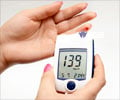Babies with neonatal diabetes can be safely and effectively treated with sulphonylurea tablets instead of insulin injections, revealed study.

‘Babies with neonatal diabetes can be safely and effectively treated with sulphonylurea tablets instead of insulin injections.’





Professor Andrew Hattersley is the lead of the genetic diabetes research team at the University of Exeter Medical School. In 2006, they discovered that around half of people with neonatal diabetes can come off insulin injections and be treated more effectively with sulphonylurea tablets. In these people, the tablets provide the key to unlocking the closed door of the insulin-producing beta cells. Professor Hattersley said: "Switching from regular insulin injections was life-changing for these people who had been on insulin all their life; many described it as "a miracle treatment". Not only does this eradicate the need to inject with insulin several times a day, it also means much better blood sugar control. This is the first study to establish that this treatment is safe and works excellently for at least 10 years and all indications are that it will continue to work for decades more. This is great news for the thousands of patients who have made the switch from insulin."
Dr Pamela Bowman, of the University of Exeter Medical School, who led the study, said: "It was incredibly exciting to help people make the switch from insulin to simple tablets - but the question was, would the benefits last? Half of people with type 2 diabetes treated with sulphonylureas no longer have good blood sugar control after five years. Our study has found that in neonatal diabetes, the tablets are safe and they work long term - with 93% of people in the study remaining on sulphonylureas alone after 10 years, with excellent blood sugar control."
Today, Jack's diabetes is so well managed that Emma has not had to worry about his condition since he changed treatment.
"It's like we've gone from living in a horror film to living in a rom com," said Emma, a nurse from Essex in the UK. "Before Jack switched treatment, every single night was a living nightmare. His blood sugar levels were all over the place, and I didn't think he was going to be alive when I went into his bedroom in the morning."
Advertisement
Dr Elizabeth Robertson, Director of Research at Diabetes UK, said: "It's so important that people living with rare forms of diabetes, like neonatal diabetes, receive the right diagnosis and treatment. That's why we are delighted to have been able to help fund this vital work, demonstrating for the first time that sulphonylurea tablets are a safe and effective way for some people with neonatal diabetes to manage their condition for the long term. Moving forward, we hope research will uncover ways to prevent the developmental issues people with neonatal diabetes face.
Advertisement
Source-Eurekalert















